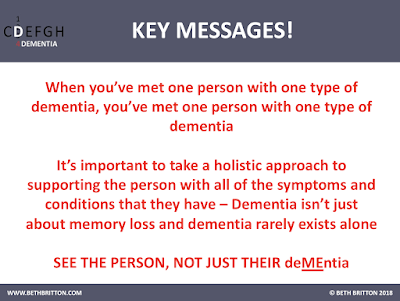This year Dementia Awareness Week is renamed Dementia Action Week to reflect the need for action for people affected by dementia rather than only focusing on awareness.
In this spirit, I’m sharing the ‘Key Messages’ from my dementia care and support training modules. The training, devised entirely by me and heavily based on personal experiences from my dad's life with dementia and the many other people I've met who are living with dementia, is something I've delivered to numerous frontline social care staff as a standalone learning experience or to supplement the bespoke training and mentoring that I provide to individual services and organisations.
Day 5: Changes associated with dementia
My fifth module is called ‘Changes associated with dementia' and covers:
- Looking beyond ‘Challenging behaviour’
- Unmet needs
- Mental, physical and emotional feelings and experiences and relating these to the person’s needs
- Reacting and responding through positive support
- Non-pharmacological interventions
- Pharmacological interventions
- The national policy on antipsychotics
- Being a detective
- Working on your approach
- Seeing the person
For me these key messages, whilst very basic to many of us, are something every person providing care and support for anyone affected by dementia should live and breathe by.
Of course, there is so much more to what is in a 3-hour training session than I could convey in a short blog, but to give you a flavour of what this is like in 'real life' the module is the start of opening up conversations about viewing the changes associated with dementia (not 'challenging behaviour') through the lens of unmet needs, how to support the person's emotions and experiences, and different approaches to alleviate the person's symptoms.
Everything I do asks learners to put themselves into the shoes of the person, so in this module learners think about their experiences of supporting a person with changed behaviour, and use 'real life' scenarios to explore some common changed behaviours through the eyes of the person experiencing them.
**ACTION FOR HEALTH AND SOCIAL CARE PROVIDERS**
PLEASE PRINT THE KEY MESSAGES IMAGE ABOVE AND PIN IT ONTO A NOTICEBOARD THAT ALL OF YOUR STAFF CAN SEE.
For more information on my training and mentoring consultancy work, please see my website: http://www.bethbritton.com.
Thank you for supporting my blog during Dementia Action Week 2018.
Until next month...
You can follow me on Twitter: @bethyb1886
Like D4Dementia on Facebook






